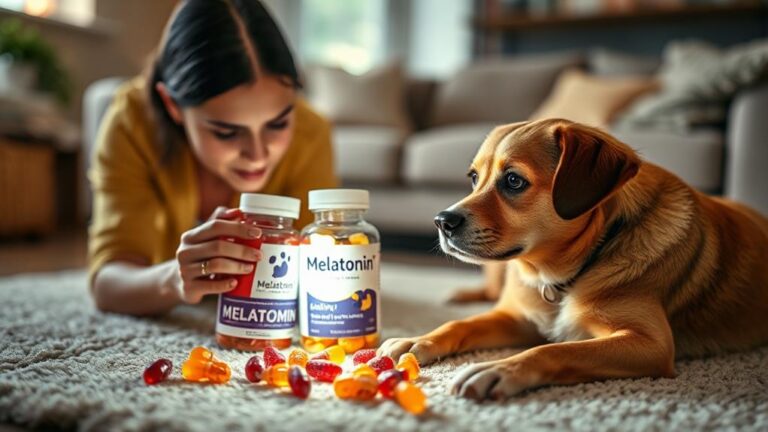If you're considering giving your dog a melatonin gummy, you might want to pause and think twice. While melatonin can help with sleep, certain ingredients in these gummies—like xylitol—pose serious risks to your canine friend. Even without harmful additives, improper dosages can lead to unwanted side effects. It's crucial to weigh the safety of melatonin for your dog and consult a vet. What might seem like a harmless solution could have unintended consequences, leaving you to wonder what alternatives exist for managing your dog's anxiety.
Effects of Melatonin Gummies
When considering melatonin gummies for your dog, it's important to understand their effects. Melatonin can cause mild symptoms like an upset stomach and sleepiness, which are typically harmless. However, some dogs may experience mild side effects such as increased drowsiness or digestive upset. While these might not seem too serious, you should still keep an eye on your furry friend.
In some cases, if a dog gets too much melatonin, it could lead to more serious issues. Signs of a severe overdose include vomiting, diarrhea, and loss of coordination. If you notice these symptoms, you'll need to contact your vet right away.
Additionally, melatonin may cause complications such as high blood pressure and seizures. It's essential to monitor your dog closely after they've taken the gummies. Some dogs might also react by having a fast heart rate or further digestive upset.
To guarantee your dog stays safe, always consult with a veterinarian before giving them melatonin. They can help you determine the right dosage for your pet. This way, you can make certain the gummies are effective without harming your dog. By understanding these effects, you can make better choices for your dog's health and well-being.
Safety of Melatonin for Dogs
Understanding the safety of melatonin for dogs is essential for any pet owner considering it as a supplement. Melatonin can be safe for dogs when given at the right dose, but it's important to check with your vet first. Safe dosage guidelines are critical to prevent potential side effects. Your dog's health plays a big role in whether melatonin is a good choice. If your dog has health problems or takes certain medications, melatonin might not be suitable.
Keep in mind that not all melatonin products you find at the store are safe for dogs. Some of them might contain harmful ingredients like xylitol, which can be dangerous.
Proper dosing is critical. Giving your dog too much melatonin can lead to serious side effects. If you notice any unusual symptoms after giving melatonin, you should contact your vet right away.
When administered correctly, melatonin can help your dog sleep better and reduce anxiety. Always remember to consult your veterinarian before starting any new supplement to ascertain it's safe for your furry friend!
Risks of Melatonin Ingestion
While melatonin can be beneficial for helping dogs with sleep issues or anxiety, it's important to be aware of the potential risks involved with its ingestion.
Ingesting melatonin gummies can lead to mild symptoms in dogs like an upset stomach or excessive sleepiness. You might notice your dog acting more tired than usual or having tummy troubles after eating a gummy.
However, severe overdoses of melatonin can cause more serious problems. If your dog eats a lot of gummies, it may experience vomiting, diarrhea, or even loss of coordination. In extreme cases, this could lead to seizures or high blood pressure, which is very serious.
Additionally, some melatonin gummies may contain xylitol, a sweetener that's highly toxic to dogs. Xylitol can cause lethargy, vomiting, and seizures. The toxic dose is about 0.05 grams for each pound your dog weighs, so it's essential to check the ingredient labels carefully.
Understanding Xylitol Toxicity
Xylitol poses a serious risk to dogs, making it essential for pet owners to be vigilant about what they feed their furry friends. This sugar substitute is very toxic, with just 0.05 grams per pound being enough to cause harm.
If your dog eats something containing xylitol, keep an eye out for these severe symptoms:
- Lethargy – Your dog may seem unusually tired or weak.
- Vomiting – They might throw up soon after eating.
- Seizures – Some dogs can have seizures that need immediate attention.
- Unsteady Walking – They might have trouble standing or walking straight.
Common sources of xylitol include sugar-free gums, breath mints, and even certain gummy vitamins meant for humans. It's super important to check ingredient labels carefully before giving anything to your dog.
If you suspect your dog has ingested xylitol, don't waste time. Get them to the veterinarian right away. This ingredient can cause serious drops in blood sugar levels and more dangerous complications. Being aware and taking quick action can save your dog's life!
Alternatives for Dog Anxiety
When your dog struggles with anxiety, there are several effective alternatives to evaluate. While melatonin can help, it's smart to explore other options. Always talk to your vet first.
Medications like Benadryl, Prozac, Trazodone, and Xanax might be prescribed for your dog. These can work well depending on how serious the anxiety is.
You might also investigate non-medical ways to ease anxiety. Behavioral therapy and training can teach your dog to feel calmer. Sometimes, simple things like comforting wraps can make a big difference. Pheromone diffusers can also help create a soothing environment.
If you choose to use melatonin or any medication, give it about 30 minutes before your dog faces anxiety triggers. Melatonin usually takes 1-2 hours to work, so timing matters.
After giving any treatment, keep a close eye on your dog. Watch for side effects and see how they react to the approach you chose. With a little patience and the right solutions, you can help your furry friend feel more at ease.
Conclusion
To sum up, melatonin gummies can be risky for your dog. They might cause mild problems like drowsiness or upset stomach. If the gummies have xylitol, they can be very dangerous. Always talk to your vet before giving your dog melatonin to make sure it's safe and the right dose.
If you're looking for ways to help your dog with anxiety, ask your vet about other safe options too. Keeping your pet healthy is the most important thing!



